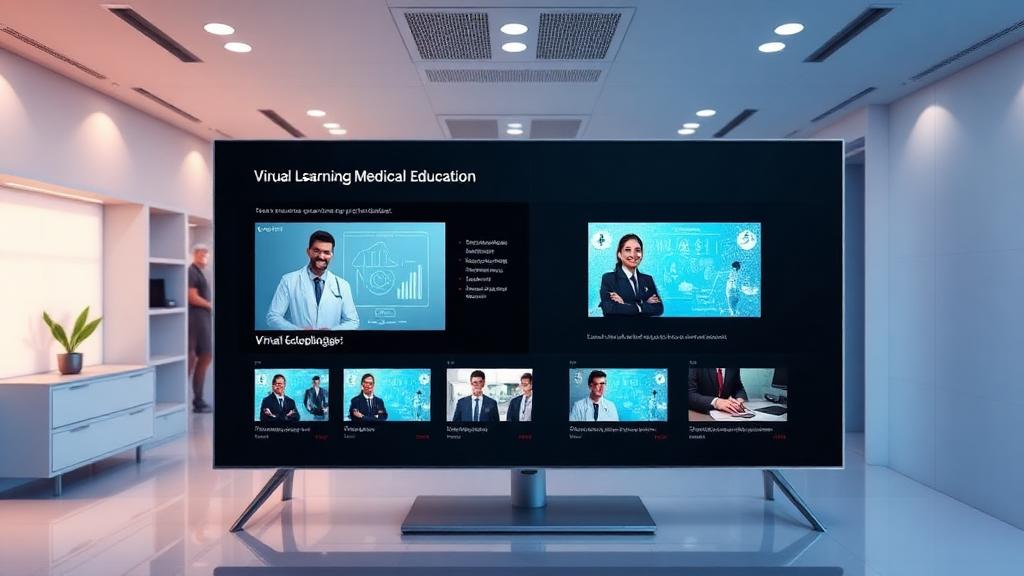Back to Blog
E-Learning
Featured
Interactive Case Study Platforms: Immersive Clinical Learning
Discover how interactive case study platforms transform medical education through immersive, branching scenarios that mirror real clinical decision-making.

Interactive Case Study Platforms: Immersive Clinical Learning
Interactive case study platforms are revolutionizing medical education by creating immersive, branching clinical scenarios that mirror real-world decision-making processes, enabling healthcare professionals to practice complex reasoning skills in risk-free virtual environments.
Transforming Clinical Education Through Interactivity
Traditional case studies are evolving into dynamic, interactive experiences that engage healthcare professionals through realistic patient scenarios, immediate feedback, and adaptive learning pathways that respond to individual decision-making patterns.
Core Interactive Elements
Branching Scenario Architecture
Multiple decision pathways and outcomes. Realistic consequence modeling. Time-sensitive decision points. Adaptive difficulty progression.
Virtual Patient Integration
Lifelike patient presentations. Interactive physical examinations. Dynamic symptom evolution. Realistic patient communication.
Advanced Simulation Capabilities
Modern interactive platforms leverage cutting-edge technologies to create highly realistic clinical environments that challenge healthcare professionals across multiple competency domains.
Multi-Modal Learning Integration
3D anatomical visualizations. Laboratory result interpretation. Imaging study analysis. Procedure simulation components.
Intelligent Assessment and Feedback
AI-powered assessment systems provide immediate, personalized feedback that helps learners understand the rationale behind clinical decisions and identify areas for improvement.
Adaptive Feedback Mechanisms
Real-time decision analysis. Evidence-based rationale explanations. Alternative approach suggestions. Learning objective alignment.
Collaborative Learning Features
Interactive platforms facilitate collaborative problem-solving by enabling team-based case discussions and peer learning opportunities that mirror real clinical environments.
Team-Based Scenarios
Multi-disciplinary case management. Role-specific decision points. Communication skill development. Collaborative care planning.
Specialty-Specific Customization
Platforms adapt to different medical specialties by offering tailored scenarios that reflect the unique challenges and decision-making processes of various healthcare disciplines.
Specialty Applications
Emergency Medicine:** Time-critical decision scenarios Surgery:** Pre-operative planning and complication management Internal Medicine:** Complex diagnostic reasoning Pediatrics:** Age-specific assessment and treatment
Performance Analytics and Tracking
Comprehensive analytics provide insights into learning patterns, competency development, and areas requiring additional focus or remediation.
"Interactive case study platforms have improved clinical reasoning scores by 45% while increasing learner engagement and knowledge retention compared to traditional case-based learning."
Learning Analytics
Decision pathway analysis. Time-to-decision tracking. Accuracy and confidence correlation. Learning objective mastery.
Integration with Clinical Practice
Platforms seamlessly integrate with existing healthcare systems and workflows, enabling point-of-care learning and just-in-time educational interventions.
Workflow Integration
Electronic health record connectivity. Clinical decision support integration. Real-time learning recommendations. Practice-based learning opportunities.
Quality Assurance and Validation
Rigorous content validation processes ensure that interactive cases accurately reflect clinical reality and maintain the highest educational standards.
Content Validation
Expert clinical review processes. Evidence-based scenario development. Outcomes validation studies. Continuous content updates.
Accessibility and Inclusivity
Modern platforms prioritize accessibility, ensuring that interactive case studies are available to healthcare professionals with diverse learning needs and technological capabilities.
Universal Design Features
Multi-device compatibility. Assistive technology support. Multiple language options. Bandwidth optimization.
Future Innovations
Emerging technologies including virtual reality, artificial intelligence, and natural language processing promise to make interactive case studies even more immersive and effective.
Next-Generation Features
Virtual reality patient encounters. Natural language patient interaction. Predictive learning analytics. Augmented reality clinical integration.
"Meaningful progress in healthcare happens when evidence, expertise, and community connect."







.jpg)